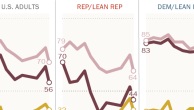For our latest survey data about news influencers, read the “News Influencers Fact Sheet.”
- News influencers – People who regularly post about current events and civic issues on social media and have at least 100,000 followers on any of Facebook, Instagram, TikTok, X (formerly Twitter) or YouTube.
- Political orientation – A measure of a news influencer’s partisan or ideological views. A right-leaning news influencer is one who publicly expresses that they identify as a Republican or conservative or support Donald Trump in the 2024 presidential election. A left-leaning news influencer is one who publicly expresses that they identify as a Democrat, liberal or progressive or support Vice President Kamala Harris (or supported President Joe Biden before he dropped out of the race) in the 2024 election. This information was found in the bio, profile picture, banner image, pinned posts or recent posts on an influencer’s social media account, any personal website or professional page, and prominent media coverage.
- Values and identities – Language or imagery in the bio, profile picture, banner image or pinned posts on an influencer’s social media account that expresses specific beliefs or identities.
- News organization affiliation – An influencer with this affiliation is one who either currently works for or previously worked for a news organization, as well as freelancers who have regularly contributed to news organizations. A news organization can be any news outlet that has a staff and multiple bylines. Researchers considered affiliated influencers to have this background regardless of their news organization’s political orientation, audience size or primary publishing method (digital, TV, print, etc.).
- Major social media sites – The five primary sites we studied, chosen based on audience size and the presence of discussion about news: Facebook, Instagram, TikTok, X (formerly Twitter) and YouTube.
While it’s important to shed light on who these new social media news providers are, a full understanding of the modern news environment also requires getting a sense of what these news influencers are posting about.
What is a news influencer?
In this study, we use the term “news influencers” to refer to individuals who regularly post about current events and civic issues on social media and have at least 100,000 followers on any of Facebook, Instagram, TikTok, X (formerly Twitter) or YouTube. News influencers can be journalists who are or were affiliated with a news organization or independent content creators, but they must be people and not organizations.
Refer to the methodology for more about how we identified news influencers.
Given the sheer volume of posts, this is not an easy task. The seemingly endless stream of content coming from these accounts would be exceedingly time-consuming for a group of human coders to analyze, so we used automated tools to collect these posts and turned to OpenAI’s GPT-4 model for classification. The output of this model was validated by a team of trained human coders.
We collected all public posts by the 500 news influencers in our sample for three weeks over the summer of 2024: July 15-21, July 29-Aug. 4 and Aug. 19-25. Some of these weeks included major election-related events. The first week started just days after an assassination attempt on Donald Trump at a campaign rally and included the Republican National Convention, as well as President Joe Biden dropping out of the race. And the third week included the Democratic National Convention.
We provided the model with the text from all posts, as well as transcriptions of videos on TikTok, Instagram and YouTube, but we did not include videos on other sites or images on any site. Each post was supplied on its own, without the surrounding context, which may limit the ability to categorize the post. Replies – posts directly responding to another message – in particular have less meaning when standing on their own.
The model did not recognize any mentions of current events or civic issues in 57% of the posts by the news influencers in our sample during these three weeks. This may be due to a mix of factors: the analysis limitations mentioned above, as well as news influencers posting about other topics.
Still, 43% of the posts did address these kinds of issues. The remainder of this chapter looks in more detail at these posts.
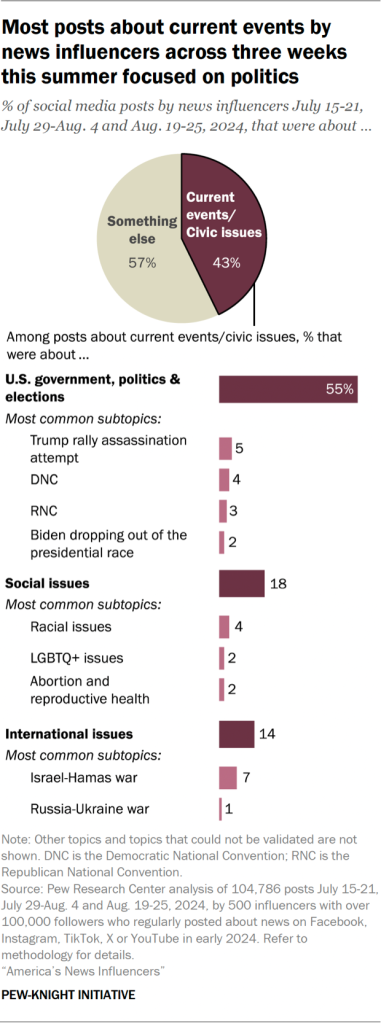
Among the posts that referenced current events or civic issues, a majority (55%) were about government, politics or the presidential election. This includes posts on several specific events that occurred during the weeks studied, including the first assassination attempt on Trump in July (5%), the Democratic National Convention (DNC) in August (4%), the Republican National Convention (RNC) in July (3%) and Biden’s withdrawal from the race on July 21 (2%). The presence of these topics suggests that news influencers are incorporating discussion of real-time events in their posts.
About one-in-five of the posts about current events (18%) focused on social issues such as racial issues (4%), LGBTQ+ issues (2%) and abortion (2%). Other topics that fell into this category include guns, education and culture war issues.
A slightly smaller share (14%) were about international issues – a sometimes small but often important component of the current events discussion in America. Many internationally focused posts were about the Israel-Hamas war (7% of all news-related posts), while 1% of all posts were about the Russia-Ukraine war.
No other topic was discussed in more than 4% of all posts by news influencers about current events during the study period: 3% of posts were about technology and 3% were about crime.
News influencers often respond to the news of the day
The weeks we chose to collect posts for analysis – and even the year we did this study – impact the findings. The study was conducted not only in the midst of a presidential election year but also during a period of major election-related news events, perhaps contributing to the high percentage of politics-related posts.
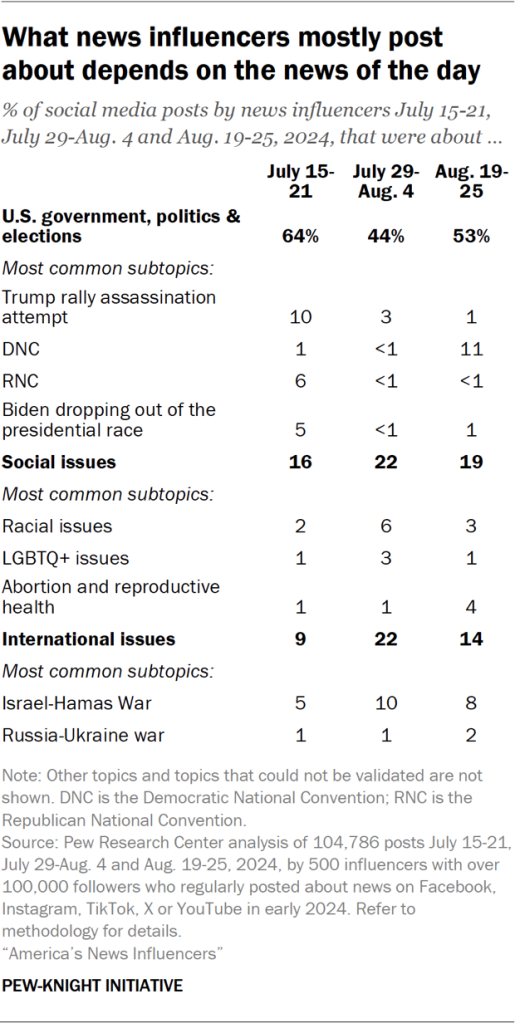
Compared with other weeks studied, posts from July 15-21 were more likely to be about government and the election: 64% of all posts focused on current events and civic issues had this focus, compared with 44% of these posts July 29-Aug. 4 and 53% of these posts Aug. 19-25. There were several major election-related events around that week, including the first assassination attempt on Trump on July 13 (10% of all news-related posts that week), the RNC, held from July 15-18 (6%), and Biden dropping out of the race on July 21 (5%).
During the week of July 29-Aug. 4, there was a higher share of posts about social issues (22%) and international affairs (22%). There were several major international events that week, including the death of Hamas leader Ismail Haniyeh in a bombing in Tehran on July 31 and Russia’s release of journalist Evan Gershkovich on Aug. 1.
Compared with other weeks, posts from Aug. 19-25 were especially likely to be about the DNC (11%), which was held that week.
How topics vary across social media sites
Across all weeks studied, there was variation across sites in which topics were discussed more or less often.
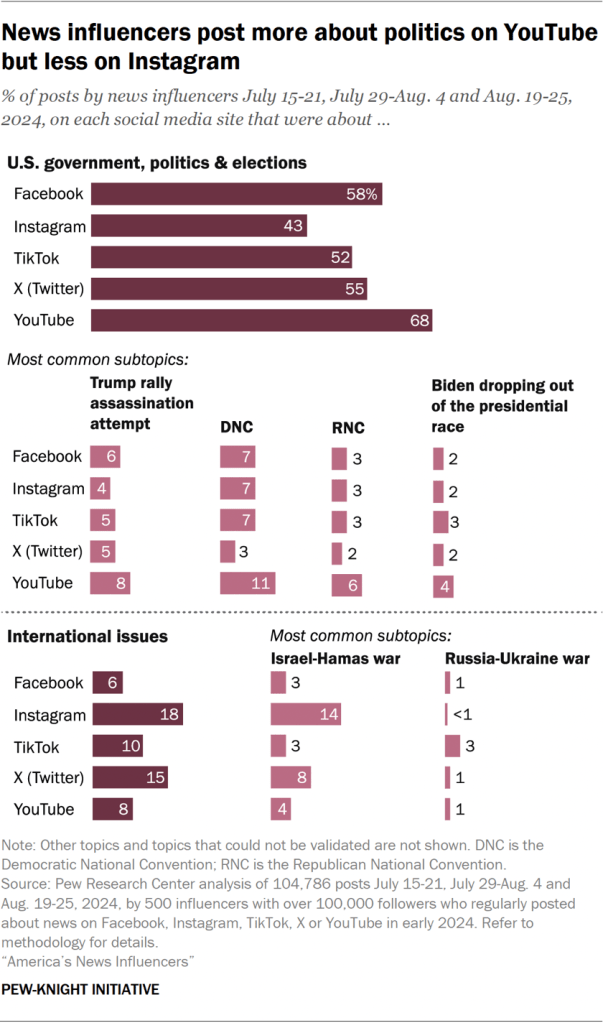
- On the whole, news influencers on YouTube were more likely to discuss government, politics and the election (68% of all posts related to current events and civic issues), while politics were less central to the conversation on Instagram (43%).
- The Israel-Hamas war was discussed more on Instagram than any other site (14% of all news-related posts), while just 3% of posts on TikTok and Facebook and 4% of YouTube posts addressed the conflict.
- News influencers on X (3%) were less likely to cover the Democratic National Convention than YouTube news influencers (11%).
What are influencers’ most common topics?
So far, this chapter has looked at the raw percentage of posts about each topic. But these numbers can be heavily affected by influencers who post much more often than others. Another way of analyzing the topics that news influencers are posting about is to look at the most common topic related to current events and civic issues discussed by each influencer.
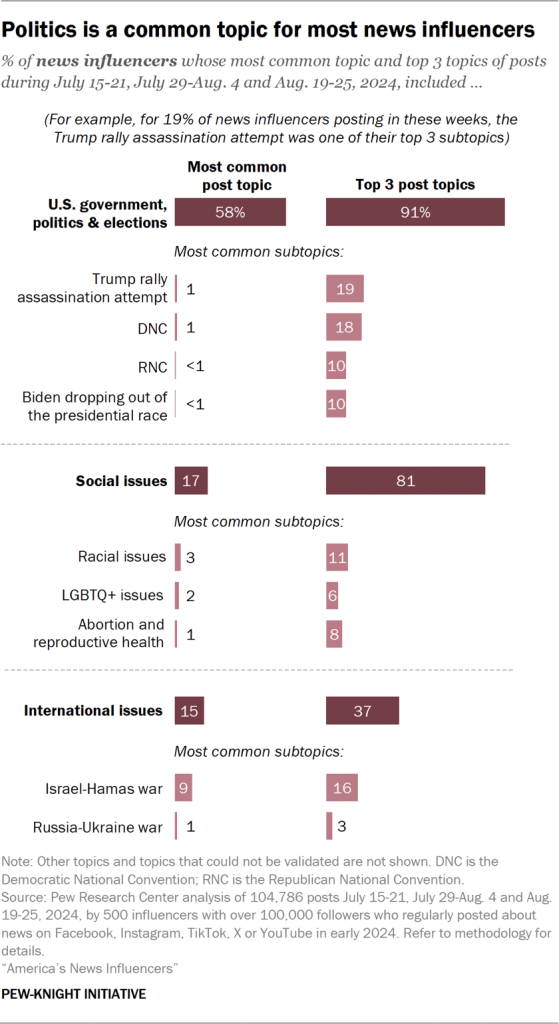
In this case as well, the most common topic for the majority of news influencers (58%) is government, politics and the election. Indeed, U.S. politics ranks among the top three topics for 91% of influencers.
Social issues are the primary topic for 17% of influencers, including small shares who focus on race, LGBTQ+ issues and abortion. Most influencers discuss social issues at one time or another: This broad category ranks among the top three topics for 81% of all influencers in our sample.
International issues are the most common topic for 15% of news influencers, including 9% who focus most often on the Israel-Hamas war. But most influencers are not talking about foreign affairs: International issues are not among the three most common topics for 63% of news influencers.



